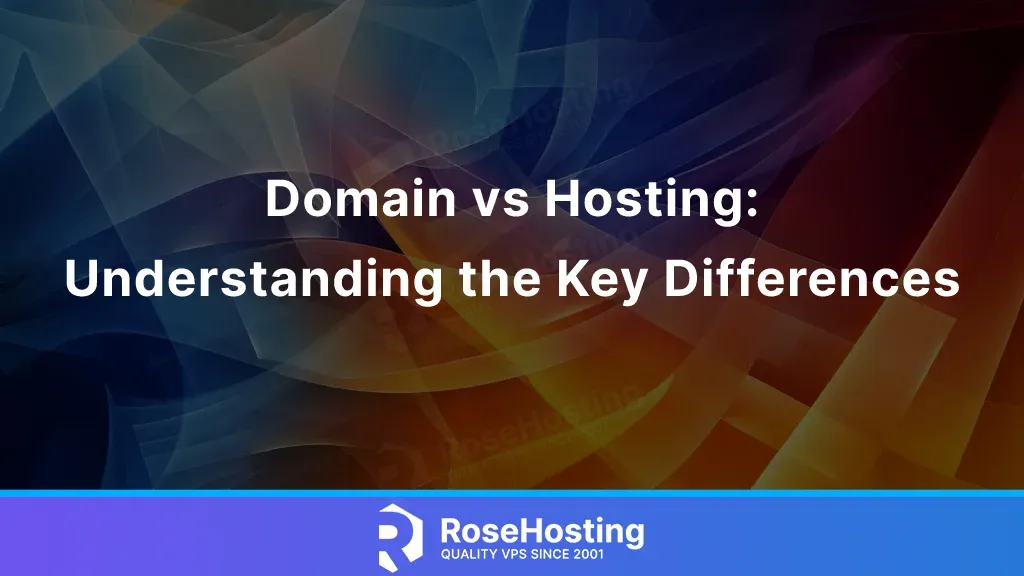
Whether you’re establishing a personal blog or promoting a business, it’s helpful to understand the fundamental aspects of a website. Two of these aspects include your “domain” vs “hosting.” These are often used interchangeably, but they have different and distinct purposes.
In this article, we’ll clarify the key differences between a domain and hosting and hopefully provide you with the knowledge you need to build your online presence successfully.
Table of Contents
Section 1: What is a Domain?

A domain is simply the address of your website on the Internet. It’s the thing that allows users to find and access your content easily. It plays a pretty crucial role when it comes to establishing your online identity. Therefore, you must understand its components and functions.
Definition of a Domain
At its core, a domain is an identifier that can be read by people, and that connects to an IP address or several IP addresses. The IP address is a numerical label given to devices connected to a computer network. This system allows people to access websites without having to remember a string of numbers. So, for example, instead of typing in a long bunch of numbers, a user can just enter “www.example.com” into their web browser to reach your specific website.
Components of a Domain
A domain name consists of two main parts: the second-level domain (SLD) and the top-level domain (TLD). An SLD is a unique name that the website owner chooses. The TLD shows the type of organization or geographical area associated with the domain.
So, some common TLDs include .com, .org, and .net, as well as country-specific extensions like .uk or .ca. Put together, these components create a complete domain name, like our “example.com” example above. You get the drift!
How Domains Work
When a user types a domain name into their internet browser, the Domain Name System (DNS) automatically translates that name into the appropriate corresponding IP address. This process involves several steps that we won’t go into great depth about, but it includes querying DNS servers to find the correct address associated with the domain.
Once the IP address is found, the browser can connect to the web server hosting the website, allowing the user to view the associated content.
Domain Registration

To have a unique web address, you must register the domain name of your choice via a domain registrar. This process involves checking that the name you want is available. Typically, a .com will be your first port of call by default. Local businesses may prefer a country-specific TLD like .com.au in Australia or .co.uk in the United Kingdom. SaaS link-building agencies might choose something with .ai or .io to suit their business.
Domain registration is usually done annually by autorenewal. You should keep track of renewal dates to avoid losing domain ownership and ensure your payment details are up-to-date.
You also want to pick wisely. A good domain name can improve your brand’s visibility and credibility, so it’s an important consideration if you’re looking to establish a strong online presence—which you probably do!
Section 2: What is Hosting?
While a domain serves as the address for your website, hosting is the service that provides the infrastructure you need to store your website’s files and make them accessible to users online. Understanding web hosting is vital to building a website because it directly affects your site’s performance, reliability, and general UX.
And user experience is ultimately the most important factor for your business.
Definition of Hosting
Web hosting is the service that allows you to publish your website on the internet. A website includes various files, such as HTML docs, images, videos, and databases. Hosting providers give you the technology and resources you need to store these files on servers – i.e., powerful computers used to serve web content to users.
Types of Hosting
There are several types of hosting services, each of which is useful for different needs and budgets. Here are some of the most common types you can encounter:
- Shared hosting is the most affordable option. Multiple websites share the same server resources, making it cost-effective. However, its performance can be affected during peak traffic times since the resources are limited and shared.
- Virtual Private Server or VPS hosting is a nice middle ground between shared and dedicated hosting. This system involves dividing a physical server into multiple virtual servers. This means dedicated resources are provided and significantly better performance can be enjoyed than with shared hosting.
- In dedicated hosting, the entire server is allocated to a single website. This option offers maximum performance, control, and security, making it ideal for large businesses and high-traffic websites like government websites.
- Cloud hosting is a system of interconnected servers for hosting websites. This nifty setup allows for scalability because resources can be scaled up or down based on demand, making it suitable for websites with fluctuating traffic. The downside of cloud hosting is its expensive cost and low value for money.
- Managed hosting: Managed hosting can apply to all hosting mentioned above. It provides additional services, including server management, security, and backups. This allows website owners to focus on creating great content rather than dealing with complex technical issues.
How Hosting Works

When someone wants to access the telecoms SEO, for example, their internet browser will send a request to the hosting server where the website’s files are stored. The server then processes this request and sends the relevant files back to the user’s browser, which allows them to view the website. How quickly and reliably this happens depends on the hosting provider’s infrastructure and resources.
Choosing a Hosting Provider
When choosing a hosting provider, you want to carefully consider your options, as this is a crucial aspect of your website’s success. When evaluating your hosting options, you should consider the following factors:
- Reliability: You want to find providers with a strong uptime record to ensure your website is accessible to users 24/7.
- Speed: Fast loading times will improve the user experience and positively impact your search engine rankings.
- Customer support: Reliable customer support is vital for resolving any technical issues quickly and efficiently.
- Scalability: You want to pick a provider that allows you to upgrade your hosting plan as your website grows.
Section 3: Key Differences Between a Domain vs Hosting
While both domain and hosting are vital components of a website, there are a few key differences between them:
Ownership

One of the main differences between a domain vs hosting is ownership. When you register a domain name, you own that specific name for some time. Typically, it is for one year, though it can be renewed indefinitely, so long as you continue to pay the registration fees.
This means you can enjoy complete control over the domain name and use it with whichever hosting provider you choose. The Internet is your oyster!
On the other hand, hosting is a service you rent instead of owning. When you sign up for a hosting plan, you are renting space on a server to store your website’s files. This means you don’t own the server itself – you are just paying for the hosting company’s resources and services. However, in rare cases, the best hosting providers allow you to do what you wish with your rented server.
You can switch hosting providers without losing your domain name so long as you keep it registered.
Functionality
Another obvious difference between a domain vs hosting is their functionality. A domain is the address that users enter into their web browsers to access your website. It is a critical aspect of your online identity, allowing users to find and remember your site easily.
On the other hand, hosting is responsible for storing and delivering your website’s content. It provides the infrastructure needed to ensure your website is accessible to users around the clock. Without hosting, your domain would lead to a dead end, with no files or content to display.
Dependency

Domains and hosting are distinct but interdependent. A website can’t function without both of these. The domain name directs users to the hosting server where the website files are stored. Users can’t access your website if you have a registered domain but no hosting. On the other hand, if you have hosting without a domain, your website will be live, but users will struggle to find it without a memorable web address.
Cost
Finally, the costs associated with domains and hosting are different. Domain registration typically involves an annual fee that varies depending on the registrar and the chosen domain extension. Some domains, especially those with popular extensions or “premium” names, can be more expensive due to supply and demand.
Hosting costs, however, can vary greatly depending on the type of hosting service you choose and the features included in your plan. Shared hosting is usually the most affordable option, while dedicated and cloud hosting can be one of the more expensive due to the resources offered. Managed hosting can be an upgrade to all types of hosting and is an additional cost, but typically, it is the best value you can get.
Final Thoughts
Understanding the differences between a domain vs hosting is vital for establishing an online presence. Hopefully, the information above will help you make informed decisions about selecting a domain name and a hosting provider. Choose a reputable provider and choose a relevant domain name to create a strong foundation for your online presence.